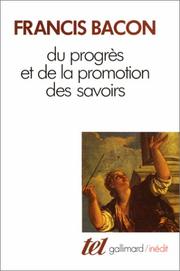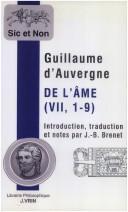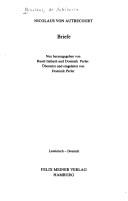Book
ISBN: 8822230019 9788822230010 Year: 1981 Volume: 2 Publisher: Firenze Olschki
Abstract | Keywords | Export | Availability | Bookmark
 Loading...
Loading...Choose an application
- Reference Manager
- EndNote
- RefWorks (Direct export to RefWorks)
Logic --- Knowledge, Theory of --- Definition (Philosophy) --- Logique --- Théorie de la connaissance --- Définition (Philosophie) --- Early works to 1800. --- Ouvrages avant 1800 --- Aristotle. --- Early works to 1800 --- Théorie de la connaissance --- Définition (Philosophie) --- Definability --- Definition (Logic) --- Undefinability --- Philosophy --- Semantics (Philosophy) --- Aristoteles. --- Logic - Early works to 1800 --- Knowledge, Theory of - Early works to 1800 --- Definition (Philosophy) - Early works to 1800 --- Aristotle. - Posterior analytics

ISBN: 2070721418 9782070721412 Year: 1991 Volume: 178 Publisher: Paris : Gallimard,
Abstract | Keywords | Export | Availability | Bookmark
 Loading...
Loading...Choose an application
- Reference Manager
- EndNote
- RefWorks (Direct export to RefWorks)
"Le savoir dérivé d'Aristote, s'il est soustrait au libre examen, ne montrera pas plus haut que le savoir qu'Aristote avait." Dans les arts mécaniques, le début est grossier puis l'on développe et perfectionne - ce que Bacon baptise ici "progrès". S'il n'en va pas de même pour les savoirs, c'est ce que, dans la société, la science est une grande incomprise. Que faire pour y remédier ? Bien des choses, et d'abord convaincre l'Etat de s'en mêler. Publié en anglais en 1605, Du progrès n'a connu jusqu'ici qu'une traduction française, en 1624. La phrase qui recommande le libre examen d'Aristote y a été censurée, comme tout ce qui touche à la scolastique. Bacon lui-même, en se faisant traduire en latin pour le Continent, expurge son livre. L'audace intellectuelle de l'original n'avait donc pas encore vraiment franchi la Manche. L'essentiel fut cependant entendu de tous au XVIIe siècle : les sciences, produites par l'effort humain, doivent être distinguées de la religion
Science --- Sciences --- Philosophy --- Philosophie --- Logic --- Knowledge, Theory of --- Learning --- Methodology --- Logic - Early works to 1800. --- Knowledge, Theory of - Early works to 1800. --- Learning - Philosophy - Early works to 1800. --- Science - Methodology - Early works to 1800. --- Induction (logique) --- Progrès. --- Méthodologie --- Fortschritt. --- Induction (Logic) --- Induction (Logic). --- Induction (Logique) --- Wissenschaft. --- Methodology. --- Philosophy. --- Ouvrages avant 1800. --- Philosophie.
Book
ISBN: 0938060465 9780938060468 Year: 1996 Publisher: Minneapolis : A.J. Banning Press,
Abstract | Keywords | Export | Availability | Bookmark
 Loading...
Loading...Choose an application
- Reference Manager
- EndNote
- RefWorks (Direct export to RefWorks)
Wisdom --- Knowledge, Theory of (Religion) --- Sagesse --- Théorie de la connaissance (Religion) --- Religious aspects --- Christianity --- Early works to 1800 --- Aspect religieux --- Christianisme --- Ouvrages avant 1800 --- Ouvrages avant1800 --- Knowledge, Theory of --- Théorie de la connaissance (Religion) --- Early works to 1800. --- Wisdom - Religious aspects - Christianity - Early works to 1800 --- Knowledge, Theory of - Early works to 1800

ISBN: 2711613682 9782711613687 Year: 1998 Publisher: Paris Vrin
Abstract | Keywords | Export | Availability | Bookmark
 Loading...
Loading...Choose an application
- Reference Manager
- EndNote
- RefWorks (Direct export to RefWorks)
Soul --- Knowledge, Theory of --- Ame --- Théorie de la connaissance --- Early works to 1800 --- Ouvrages avant 1800 --- Theology --- Christian theology --- Theology, Christian --- Christianity --- Religion --- Epistemology --- Theory of knowledge --- Philosophy --- Psychology --- Théorie de la connaissance --- Knowledge, Theory of - Early works to 1800 --- Theology - Early works to 1800
Book
ISBN: 1472557972 0715640895 9780715640890 Year: 2012 Publisher: London Duckworth
Abstract | Keywords | Export | Availability | Bookmark
 Loading...
Loading...Choose an application
- Reference Manager
- EndNote
- RefWorks (Direct export to RefWorks)
In this part of the Posterior Analytics , Aristotle elaborates his assessment of how universal truths of science can be scientifically explained as inevitable in demonstrative proofs. But he introduces complications: some sciences discuss phenomena that can only be explained by higher sciences and again sometimes we reason out a cause from an effect, rather than an effect from a cause. Philoponus takes these issues further. Reasoning from particular to universal is the direction taken by induction, and in mathematics reasoning from a theorem to the higher principles from which it follows is co
Aristotle. Posterior analytics. --- Knowledge, Theory of -- Early works to 1800. --- Logic -- Early works to 1800. --- Philosophy & Religion --- Philosophy --- Knowledge, Theory of --- Knowledge, Theory of. --- Kunskapsteori --- Logic --- Logic. --- Logik --- Aristoteles, --- Aristotle. --- Posterior analytics (Aristotle). --- Philosophy of science --- Theory of knowledge --- Aristotle --- Logique --- Théorie de la connaissance --- Early works to 1800. --- Ouvrages avant 1800
Book
ISBN: 1472558189 0715636677 9780715636671 9781472558183 9781472557971 9780715640890 9781472557834 9780715637883 1472557832 0715637886 1472557972 0715640895 Year: 2014 Publisher: London : Bloomsbury,
Abstract | Keywords | Export | Availability | Bookmark
 Loading...
Loading...Choose an application
- Reference Manager
- EndNote
- RefWorks (Direct export to RefWorks)
"Aristotle's Posterior Analytics elaborates for the first time in the history of Western philosophy the notions of science and the requirements for the distinctive kind of knowledge scientists posses. His model is mathematics and his treatment of science amounts to a philosophical discussion, from the perspective or Aristotelian syllogistic, of mathematical proofs and the principles they are based on. Chapters 1-8 expound the foundations of Aristotle's theory, pointing out the similarities and differences between scientific knowledge and other types of knowledge, establishing the need for basic principles, and identifying the types of principles and the source of necessity associated with scientific facts." "Philoponus' massive commentary, the most complete ancient discussion of Posterior Analytics book, offers uniquely valuable testimony to the way this book was read and understood in late antiquity, as well as providing information on earlier interpretations. Of particular interest is Philoponus' account of scientific principles, which is based not only on Aristotle but also on the Greek mathematical tradition, especially Euclid and his commentator Proclus."--Jacket.
Aristotle. Posterior analytics. --- Knowledge, Theory of -- Early works to 1800. --- Logic -- Early works to 1800. --- Philosophy & Religion --- Philosophy --- Knowledge, Theory of --- Logic --- Aristotle. --- Philoponus, John, --- Philosophy of science --- Theory of knowledge --- Aristotle --- Logique --- Théorie de la connaissance --- Philosophie --- Ouvrages avant 1800. --- Aristote, --- Aristote (0384-0322 av. J.-C.). --- Critique et interprétation --- Théorie de la connaissance --- Early works to 1800 --- Ouvrages avant 1800 --- Aristote
Book
ISSN: 07654685 ISBN: 9782915611175 9782915552959 9782915611724 2915611726 2915611173 Year: 2008 Publisher: [Dijon] : Ed. universitaires de Dijon,
Abstract | Keywords | Export | Availability | Bookmark
 Loading...
Loading...Choose an application
- Reference Manager
- EndNote
- RefWorks (Direct export to RefWorks)
Self-knowledge, Theory of --- Philosophy, French --- French philosophical treatises --- Humanism --- 17th century --- Connaissance de soi --- Philosophical anthropology --- Religious studies --- Solitude --- Mind and body --- Esprit et corps --- Early works to 1800. --- Early works to 1800 --- Ouvrages avant 1800 --- Self-knowledge, Theory of - Early works to 1800 --- Philosophy, French - 17th century --- Philosophie --- France --- 17e siècle --- 18e siècle
Book
ISBN: 9780197266595 0197266592 Year: 2020 Publisher: Oxford : Oxford university press,
Abstract | Keywords | Export | Availability | Bookmark
 Loading...
Loading...Choose an application
- Reference Manager
- EndNote
- RefWorks (Direct export to RefWorks)
Robert Greystones on Certainty and Skepticism: Selections from His Works is a continuation of the volume previously published by Auctores Britannici Medii Aevi, Robert Greystones on the Freedom of the Will: Selections from His Commentary on the Sentences (edited by Mark O Henninger, with Robert Andrews and Jennifer Ottman, 2017). In the course of preparation of the first volume, startling information arose concerning the nature and extent of Greystones' skepticism. Following draft editions of a number of Greystones' Sentences commentary questions, the most relevant five questions were selected for editing and translation. Greystones is in the tradition of Nicholas of Autrecourt, William Crathorn, Monachus Niger (the Black Monk), Nicholas Aston, and John Went, but the earliest of these figures. Building upon the 69th proposition of the Condemnation of 1277, Greystones concludes that God's unlimited power must lead to a radical skepticism about human knowledge. We cannot be certain whether we are in this life or the afterlife, in a body or not. We cannot be certain about the existence of any external object. We have no certain knowledge of cause and effect, the existence of substances, or of any contingent event. Like Descartes, Greystones held that we can be certain about our own existence (ego sum). But preempting Descartes' appeal to a beneficent, non-deceptive God, Greystones says: God does not deceive. But you deceive yourself if you insist on believing that something exists when you know that it might not! You know that God can intervene at any instant, and thus that you can never completely trust your senses. Greystones' skepticism is strikingly significant in light of the later historical development of philosophy.
Certainty --- Certainty. --- Knowledge, Theory of --- Knowledge, Theory of. --- Philosophy, Medieval. --- Skepticism --- Skepticism. --- Skeptizismus. --- History --- Robertus, --- Greystones, Robert, --- To 1500. --- Skepticism - Early works to 1800 --- Certainty - Early works to 1800 --- Knowledge, Theory of - Early works to 1800 --- Philosophy, Medieval --- Skepticism - History - To 1500 --- Robertus de Graystanes ca. um 1336 --- Greystones, Robert, - approximately 1289-1334

ISBN: 3787307524 9783787307524 Year: 1988 Volume: 413 Publisher: Hamburg Meiner
Abstract | Keywords | Export | Availability | Bookmark
 Loading...
Loading...Choose an application
- Reference Manager
- EndNote
- RefWorks (Direct export to RefWorks)
History of philosophy --- Knowledge, Theory of --- Philosophers --- -Correspondence --- -Nicolaus --- Correspondence --- -Philosophers --- -#GROL:SEMI-1-05'13' --- Scholars --- Epistemology --- Theory of knowledge --- Philosophy --- Psychology --- Early works to 1800 --- -Nicolaus de Autricuria --- Nicolaus --- #GROL:SEMI-1-05'13' --- Correspondence&delete& --- Nicolaus, --- Autrecourt, Nicolas d', --- Autrecourt, Nicolaus d', --- Nicholas, --- Nicolas, --- Nicolaus de Autricuria, --- Correspondence. --- Nicola, --- Knowledge, Theory of - Early works to 1800 --- Philosophers - France - Correspondence - Early works to 1800 --- Nicolaus - de Autricuria - - Correspondence --- Nicolaus - de Autricuria --- -Knowledge, Theory of --- -History of philosophy
Book
ISBN: 2718603712 9782718603711 Year: 1990 Volume: vol *23 Publisher: Paris Galilée
Abstract | Keywords | Export | Availability | Bookmark
 Loading...
Loading...Choose an application
- Reference Manager
- EndNote
- RefWorks (Direct export to RefWorks)
Condillac, Etienne Bonnot de, --- Psychology --- Knowledge, Theory of --- Language and languages --- Philosophy --- 165.75 --- Structuralisme. Systeemanalyse. Systeembegrip. Systeemmethodologie. Systeemleer --- 165.75 Structuralisme. Systeemanalyse. Systeembegrip. Systeemmethodologie. Systeemleer --- Psychology - Early works to 1850 --- Knowledge, Theory of - Early works to 1800 --- Language and languages - Philosophy - Early works to 1800 --- Condillac, Etienne Bonnot de, - 1714-1780 --- Condillac, Etienne Bonnot de, - 1714-1780. - Essai sur l'origine des connaissances humaines

 Search
Search Feedback
Feedback About UniCat
About UniCat  Help
Help News
News